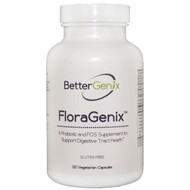Microbiome and Probiotics Part 2 (2016)
Posted by DSDC on Jun 14th 2023
Last time we talked about the Human Microbiome Project and how research has now recognized that you can’t just kill all microbes and improve health. The germ theory of disease has come a long ways. We, as human beings, are really an ecosystem that involves a complex cooperation between human and microbiome cells. You can properly assume that everything you do that helps your microbiome be healthier will repay you the favor.
To put this another way, the relationship between the microbiome is not just our body living in tolerance but it is mutually beneficial. In addition to aiding digestion, the gut microbiota synthesize vitamins and amino acids, detoxify xenobiotics, and participate in immune system homeostasis and gastrointestinal tract permeability.
For example, gut microbiota are important in the synthesis of essential aromatic amino acids; tryptophan, phenylalanine, tyrosine and phenylalanine. By essential we mean that our bodies do not synthesize these directly but must get them from external sources, in this case from bacteria in our gut or from the diet.Tryptophan is converted into 5-HTP and then serotonin, phenylalanine is converted into tyrosine, tyrosine is converted into either L-DOPA and dopamine or thyroxine (also known as T4 ie thyroid hormone). As you can see these are not trivial in the balance of human physiology.
Most detox of drugs and pesticides takes place in the liver. Seems the gut microbiota also helps regulate this activity by influencing DNA expression in the liver.
Studies are confirming that people who take probiotics and/or have a probiotic-favorable diet (more on this in a minute) seem to have a more consistent microbiome. That is to say that people who pay attention to their gut flora with supplements and diet have a more stable intestinal ecosystem with more diversity as well as stability.
We would think that adding a certain strain of bacteria to the probiotic formula would help increase the amount of bacteria in the gut of that strain type. The main effect seems to be stabilizing that ecosystem that is helping to direct traffic and not increasing the amount of the probiotic bacteria.
What is the best way to keep your gut ecosystem healthy. I refer to gut health but remember that the microbiome is a component of our skin and mucous membranes that some sort of access to the external environment.
Like I always say, health is easy, just give your body what it wants and stop giving it what it doesn’t want. Well it is easy in theory at least. In practice, this can take a lifetime to figure out. But here are some general guidelines that I hope are helpful.
Avoid herbicides and pesticides and other environmental contaminants. Be careful what you spray around your house and eat organic, free range as much as you can. I have an article in the Resource section at OVitaminPro.com about glyphosates, the active ingredient in Roundup. Also sugar and alcohol won’t do you any favors in the microbiome department. Of course you will avoid antibiotics as much as possible.
Next you can add some key foods that can help. Some examples are: yogurt, kefir, sauerkraut, miso soup, sour pickles, tempeh, kimchi and kombucha. Add a little of one or two of these to your daily routine.
And take your FloraGenix or other quality probiotic.
Following these steps should help maximize your human/microbiome ecosystem and you will be rewarded with more robust health.
